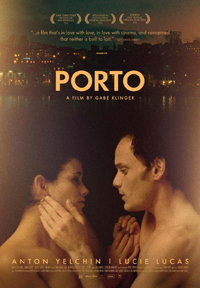Reviews
Porto | 2016 BFI London Film Festival Review
In Remembrance of Loves Past: Klinger’s Quiet Meditation on Romance, Time & Memory
 Two foreigners stumble upon a chance encounter and spend an intimate evening together in the dreamy and romantic art-house gem, named after the eponymous city in Northern Portugal where the love making and the subsequent longing takes place. Brazilian filmmaker Gabe Klinger follows his documentary Double Play: James Benning and Richard Linklater, which explored the lives and works of two visionary American filmmakers, with an equally imaginative film that dissects the memories of two strangers from different perspectives, at the same time questioning the ways in which individuals get stuck on fragments of their own experience. If anything, Porto is about what it means to be in love and to desire somebody else in moments of utter uncertainty, which is distinctively portrayed through a remarkable array of cinematic devices.
Two foreigners stumble upon a chance encounter and spend an intimate evening together in the dreamy and romantic art-house gem, named after the eponymous city in Northern Portugal where the love making and the subsequent longing takes place. Brazilian filmmaker Gabe Klinger follows his documentary Double Play: James Benning and Richard Linklater, which explored the lives and works of two visionary American filmmakers, with an equally imaginative film that dissects the memories of two strangers from different perspectives, at the same time questioning the ways in which individuals get stuck on fragments of their own experience. If anything, Porto is about what it means to be in love and to desire somebody else in moments of utter uncertainty, which is distinctively portrayed through a remarkable array of cinematic devices.
The modest plot involves two strangers discovering each other on a random day in Porto. Jake (Anton Yelchin) is an American traveler, taking on hard physical labor at an archeological site on the outskirts of the city. One day, while carrying rocks, his gaze meets Mati (Lucie Lucas), a French student working at the dig, who likewise is unable to keep her eyes off Jake. This chance encounter and the exchange of looks repeat at a train station and eventually at a café, where Jake finally takes up the courage to approach Mati, with John Lee Hooker’s electrifying blues track Shake It Baby playing in the background – a reference, in sensibility, to Jean-Luc Godard’s Bande à part according to Klinger. There is an immediate connection between the two outcasts, and they end up spending the entire night together, only to stop seeing each other the next day.
Saying that a film is not about a particular plot is nearly a cliché, but few films genuinely embrace that statement in unique and original ways. Porto is less a film about events, than it is about moments – moments that were not only lived and experienced by two people, but also the ways in which they are recollected in the present. The film’s three-part structure is telling in this respect, as the first two chapters dedicated to Jake and Mati individually tell the story from different respective points of view. We learn Mati rejects Jake the next day because she is in a relationship with her classics professor João (Paulo Calatré), which turns Jake into an obsessive stalker stuck in that evening, unable to move forward, portrayed with dismay and dispirit by Yelchin, who tragically passed away following the end of production – a reality check that makes the film all the more poignant.
While the final chapter Jake & Mati ties some of the loose ends together, not all sequences are as neatly divided as the film’s elliptical storytelling reiterates certain moments, dialogues and phrases in order to punctuate and emphasize the ways in which memories can be summoned in different ways. Indeed, the film portrays these characters as stuck in time: with the film they relive a single night, even though they are no longer living it. But rarely is there any indication to the inexplicable passion they hold for each other, as at one point the conversation reveals: “Does this scare you?” “Yes, because we don’t know what it is.”
Klinger, who grew up in Chicago working as a film critic, film studies professor and curator, conveys the sense of unrequited love with an astonishing use of celluloid film. Indeed, the most striking element of the film is its cinematography by Wyatt Garfield, which features varying textures of Super 8mm, 16mm and 35mm film stocks. There is an element of self-reflexivity here, in that the use of celluloid not only accentuates the remembrance of a love affair now vaguely settled in the characters’ memories, but also a paean to the passing of film as a format seldom in use within the film industry. Changing textures of film grain and aspect ratios invoke discrete emotions: sometimes we are face to face with the characters, sometimes the film takes a look at the expansive, visually stimulating landscape of Porto. If the film focuses on two main characters, the third is undeniably the titular city, rarely captured so vividly in film apart from Manoel de Oliveira’s (who receives a special thanks in the credits) part documentary, part essay film Porto of My Childhood.
This is filmmaking at its most evocative, at once with nostalgic overtones in bringing to mind previous masters of romance films, and signaling Klinger as an emerging filmmaker well aware of directing actors and skillfully using the city as an expressive backdrop. In short, Porto is a pensive, cinematic musing on the fractured nature of casting one’s mind back to titillating emotional experiences, and is a film that ought to be remembered in the same wistful manner.
Reviewed on Wednesday October 12th at the 2016 BFI London Film Festival. 75mins.
★★★½/☆☆☆☆☆
Emre Çağlayan is a film writer, researcher and independent scholar currently living in Canterbury, United Kingdom. He completed a PhD in Film Studies at the University of Kent, with a dissertation examining the history and aesthetics of slow cinema. In 2016, he participated at the Sarajevo Film Festival's Talents Press programme and continues to teach film courses in the UK. Top Films From Contemporary Film Auteurs: Almodóvar (Broken Embraces), Ceylan (Uzak), Dardennes (The Son), Haneke (Caché), Hsiao-Hsien (A Time to Live, a Time to Die), Kar-wai (In the Mood for Love), Kiarostami (Close-up), Tarr (Werckmeister Harmonies), Reygadas (Battle in Heaven), Van Sant (Last Days), von Trier (The Five Obstructions).

































